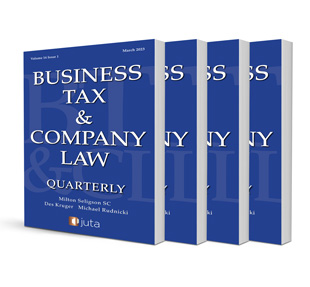
Rethinking Incentives in Africa Due to Pillar 2
Author: Esther Geldenhuys
ISSN: 2219-1585
Affiliations: Partner, Bowmans Attorneys
Source: Business Tax & Company Law Quarterly, Volume 16 Issue 2, 2025, p. 9 – 15
Abstract
It is well known that base erosion and profit shifting (BEPS) has adversely affected Africa over the years. If African countries do not participate in Pillar 2 it could again reduce African tax collection. Yet very few African countries have to date implemented or taken some form of measure to implement Pillar 2. This is despite the fact that a significant number of African countries signed either the first or the second joint statement of the OECD/G20 Inclusive Framework on BEPS to implement the two-pillar solution.
Pillar 2 aims to ensure that multinational enterprises within scope pay a minimum of 15% corporate tax in each jurisdiction in which it operates. The ground rules for Pillar 2 are set out in the Organisation for Economic Cooperation and Development Global Anti-Base Erosion Model Rules. These rules provide for three types of top-up taxes, being the income inclusion rule, the undertaxed payment rule (also known as the undertaxed profits rules) and the qualified domestic minimum top-up tax rule (also known as a domestic minimum top-up tax).
The African Tax Administration Forum strongly recommends that African countries immediately enact the qualified domestic minimum top-up tax rule as provided for under Pillar 2, to protect themselves from giving away taxing rights to other jurisdictions applying the top-up tax under Pillar 2 arising from tax incentives. However, not all tax incentives are affected by the GloBE Rules to the same extent. South Africa has various tax incentives and incentive regimes that may lower the effective tax rate to below 15%. This article considers some of these incentives in the context of the GloBE Rules.